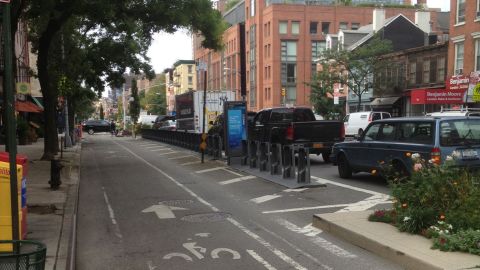Searching for the Perfect ‘Rebalancing’ Algorithm

What’s wrong with the picture above?
The picture captures a protected bike lane on 9th Avenue in New York City. In the center of the image is an empty Citibike docking station. Citibike is the largest bike share program in the country – with nearly 100,000 annual members – and there are ambitious plans for expansion.
There is one problem in particular, however, that will need to be solved if commuters are going to continue to rely on this service. That is, the service must be reliable, meaning you can’t have a situation like the one depicted in the image above. If you go to a docking station and there is no bike for you, you will be late for work. If this happens routinely, you will either lose your job or have to find another way to commute.
Call it the rebalancing problem. When a flood of commuters arrives at Grand Central Station or Penn Station, the available bikes will vanish in a New York minute. So box trucks and bike trailers are used to move bikes from station to station, “rebalancing” the supply based on demand. But how can Citibike’s dispatcher, and his or her counterpart in 500 other bike share programs worldwide, anticipate where the bikes will be needed and when? How do you account for factors like the weather? Or, as we will see below, local politics?
Enter the math geniuses. Dozens of papers have been published to solve this problem by creating the perfect commuting algorithm. Henry Grabar at Salon neatly summarizes the messy issues that planners must incorporate into their rebalancing algorithms:
Cities place and maintain docks in areas with low ridership — as a political gesture, in anticipation of future use, or to provide a transit option to an otherwise isolated place. Could a computer be made aware of these priorities, which may detract from the system’s total ridership per bicycle? If a computer program prized bicycle miles traveled over total rides taken, how would the rebalancing effort be different?




